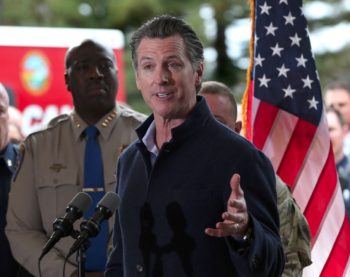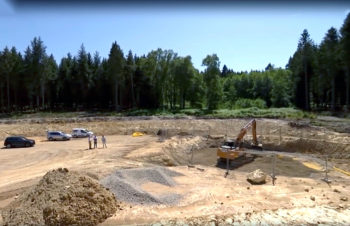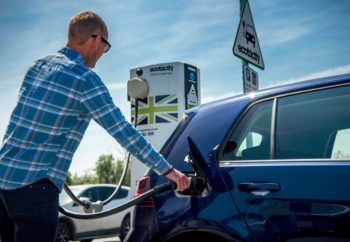
More than 2 million people are going without power in Northern and Central California, in the latest and biggest of the intentional blackouts that are, astonishingly, California’s best answer to the risk of runaway wildfires.
Power — and all the goods it makes possible — is synonymous with modern civilization.
It shouldn’t be negotiable for anyone living in a well-functioning society, or even in California, which, despite its stupendous wealth and natural splendor, has blighted itself over the decades with misgovernance and misplaced priorities.
The same California that has been the seedbed of world-famous companies that make it possible for people to send widely viewed short missives of 280 characters or less, and share and like images of grumpy cats, isn’t doing so well at keeping the lights on.
The same California that has boldly committed to transitioning to 50 percent renewable energy by 2025 — and 100 percent renewable energy by 2045 — can’t manage its existing energy infrastructure.
The same California that has pushed its electricity rates to the highest in the contiguous United States through its mandates and regulations doesn’t provide continuous access to that overpriced electricity.
California Governor Gavin Newsom, who has to try to evade responsibility for this debacle while presiding over it, blames “dog-eat-dog capitalism” for the state’s current crisis.
It sounds like he’s referring to robber barons who have descended on the state to suck it dry of profits while burning it to the ground.
But Newsom is talking about one of the most regulated industries in the state — namely California’s energy utilities, which answer to the state’s public utilities commission.
This is not exactly an Ayn Rand operation. The state could have, if it wanted, pushed the utilities to focus on the resilience and safety of its current infrastructure — implicated in some of the state’s most fearsome recent fires — as a top priority.
Instead, the commission forced costly renewable-energy initiatives on the utilities. Who cares about something as mundane as properly maintained power lines if something as supposedly epically important — and politically fashionable — as saving the planet is at stake?
Meanwhile, California has had a decades-long aversion to properly clearing forests.
The state’s leaders have long been in thrall to the belief that cutting down trees is somehow an offense against nature, even though thinning helps create healthier forests. Biomass has been allowed to build up, and it becomes the kindling for catastrophic fires.
As Chuck DeVore of the Texas Public Policy Foundation points out, a report of the Western Governors’ Association warned of this effect more than a decade ago, noting that “over time the fire-prone forests that were not thinned, burn in uncharacteristically destructive wildfires.”
In 2016, then-governor Jerry Brown actually vetoed a bill that had unanimously passed the state legislature to promote the clearing of trees dangerously close to power lines.
Brown’s team says this legislation was no big deal, but one progressive watchdog called the bill “neither insignificant nor small.”
On top of all this, more people live in remote areas susceptible to fires, in part because of the high cost of housing in more built-up areas.
There shouldn’t be any doubt that California, susceptible to drought through its history and whipped by fierce, dry winds this time of year, is always going to have a fire problem.
But there also shouldn’t be any doubt that dealing with it this poorly is the result of a series of foolish, unrealistic policy choices.
California’s overriding goal should have been safe, cheap, and reliable power, a public good so basic that it’s easy to take for granted. The state’s focus on ideological fantasies has instead ensured it has none of the above.
Read more at National Review

















Nobody gives a damn if California burns – AGAIN, nor do we care when it floods – AGAIN.
The current cause of the power outages in California is preventing wildfires because of foliage miss management. In the future blackouts will also be caused by transitioning to renewable energy. Unlike fossil fuels, renewable energy is intermittent and there is no feasible means of storing power for when the wind doesn’t blow and the sun doesn’t shine.
I live here in Siskiyou County right along the Oregon Border and so far the blackout have not reached us so far even though there was a brief blackout last Saturday. But we all know them in Sacramento don’t worry about blackouts because they have their own source of power 24/7
Could not agree more with the author of this article. Blaming this mess on the “climate crisis” is utter nonsense. Short sighted policies are a large contributor across the boards. PLENTY of blame to go around. The next potential energy “mess” will be the Northeast U.S if we have a cold winter. Blocking critical infrastructure (pipelines) in New York may leave a lot of cold, dark luxury apartments in various elitist “enclaves.” I’d humbly suggest this is all an instructional lesson, a “teachable moment” as former President Obama would say. If you want to get a taste of “energy poverty,” just keep sawing the legs out from under your energy system which, in effect, is what proposals like the Green New Deal will accelerate. Time to START having an intelligent, thoughtful & well informed debate out energy TRANSITION & attendant environmental protection. VILIFICATION of energy providers is not a SOLUTION. Looking at energy imperatives & dealing with REALITY needs to be in the forefront. This is a job for scientists, engineers & practitioners…NOT drama & theater majors…